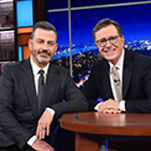The Best (and Worst) Moments in Late Night Television This Year (So Far)
(Photo Credits: HBO, Paramount, YouTube, Netflix)
Most weeks, we publish a “Late Night Last Week” column, covering the most notable developments on late night television. With the shows on holiday, this week, we look back on some of the most notable moments from the first half of 2025, from John Mulaney fighting three teens to Bill Maher’s experience at the Trump White House, and everything in between.
In the first six months of this year, one of our greatest stand-up comedians found his voice as a late night host, as one of the genre’s most promising talents headed the other direction, vacating her under-funded, post-Colbert perch for the road. A rotating cast of correspondents on another program have continued to prove that while one name may top the masthead, they are more than capable of steering the ship on their own. And on the platform soon to be formerly known as Max, one host bent the knee to the American president, spawning a strong rebuke from the man who used to introduce him at Catch a Rising Star in the pages of the Gray Lady, as another, week after week, proves that while he may be our greatest champion of democracy, he is the undisputed king of late night television. Let us begin with him.
John Oliver’s genius is his ability to see the United States. This sounds simple, but it is maybe the thing that Americans struggle with most. Perhaps it is the distance that comes with being a British-born, naturalized American citizen that makes Oliver one of the greatest commentators on today’s USA. And this does not only include politics.
The best late night bit of the year (so far) began on May 4, when Oliver dedicated a segment to one the most underappreciated treasures of this country: minor league baseball. As Oliver noted, minor league baseball teams constantly struggle to keep the lights on and attract fans. Thus, they are forced to come up with quirky, often hilarious gimmicks to bring people to the stadium, like replacing seats with toilets, or coming up with absurd casts of mascots. Oliver, for example, took a particular liking to the Rocket City Trash Pandas, a Double-A affiliate of the Los Angeles Angels.
His love for the Trash Pandas gave birth to a new idea: find a minor league team and, with the financial resources of HBO and creative genius of Last Week Tonight, give it a new name, design, and mascot. Oliver put out the call for teams to send in their pitches on why the show should pick them. One major caveat: the team would have absolutely no input on the decision whatsoever and would have to do whatever the show told them. Seems more than fair
The saga stretched out over the next two months, with Oliver providing an update on the pitches they had received on the May 18 broadcast. Shockingly, 40% of all minor league teams sent one in. Some, however, had already reached levels of hijinks that were too good to merit a rebrand. “I’m not sure what you really need us to do for you,” Oliver said to the team with the toilets. “I think we’d just be holding you back.” Oliver went on to announce the selection of the Erie SeaWolves, a Double-A affiliate of the Detroit Tigers. Part of their pitch on why they needed a rebrand: Erie, Pennsylvania, is nowhere near the sea.
It all came together on the show’s June 29 broadcast. Following a monologue on the so-called “One Big Beautiful Bill,” Oliver made the big reveal: the SeaWolves will now be known as the Moon Mammoths. The genesis of the name comes from a recreational diver who found mammoth bones in the local lake, leading to a local news story and a one-day exhibition of the fossil, which was too weak to leave out in the open. “That is basically the best-case scenario for lake bones,” Oliver observed.
Only Oliver could so beautifully capture the painful duality of America in a single episode, cuts to Medicaid and Mammoth hijinks in all. What a country.
While Oliver was busy plotting how to take over a minor league baseball team, a former minority owner of the New York Mets delivered the lowest moment in American late night television by a person not named Gutfeld. On the April 11 episode of Real Time with Bill Maher, the host recounted his dinner with President Trump. The 13-minute retelling was spent trying to reconcile his criticisms of the man and his policies with his personal charm, a dangerous false equivalency Maher himself has wisely warned against.
The monologue ended with Maher essentially waving his hands up in the air, saying, “make of it what you will.” It was an abdication of his responsibility as a broadcaster to not realize how his monologue would play: as sympathetic at best, as an endorsement at worst. And Then came Larry David, his old friend from the comedy club days, who penned a satirical essay in the New York Times, “My Dinner with Adolf.” Maher seemed genuinely shaken up about the essay when asked about it by Piers Morgan—I guess when he invited others to have an opinion, he didn’t imagine the other court jesters would object to his embracing the king.
-

-

-

-

-

-

-

-

-

-

-

-

-

-

-

-

-

-

-

-

-

-

-

-

-

-

-

-

-

-

-

-

-

-

-

-

-

-

-

-








































